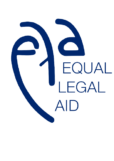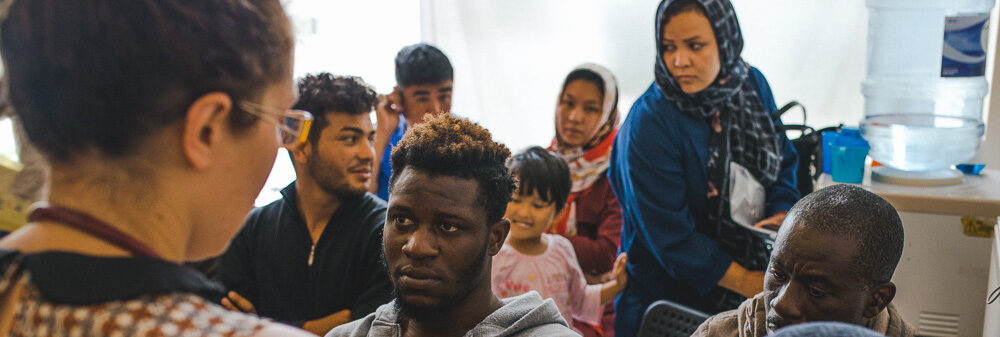The Samos Closed Controlled Access Centre (CCAC) was advertised as the solution to “ensure adequate living conditions for all groups of residents and dignified reception conditions”, yet in 2023, the living conditions in the facilities amounted to inhumane and degrading treatment. As we start a new year, we call on the Greek authorities and the European Commission to take urgent action and unite our voices to say: human rights guaranteed in 2024.
Seeking asylum is a fundamental human right. Yet, for years, people have struggled to access the asylum procedure in Greece, including Samos, due to administrative constraints and physical obstacles, namely pushbacks and general border violence.
On 3rd May 2023, Samos-based organisations issued a joint statement, calling for the immediate closure of the Samos CCAC in light of its continued failure to comply with human rights standards. Since the beginning of the operation of the Samos CCAC, civil society organisations were already alerting on the “prison-like and degrading” conditions in the structure.
An increase in arrivals on Samos, starting in August 2023, further proved the incapacity of the CCAC to accommodate people with dignity. The CCAC was originally designed to accommodate 2,040 people, which is significantly less than the number of people living in the CCAC between August and December last year. As of 31 December 2023, there were 3890 applicants for international protection registered in the CCAC. In September 2023, the authorities changed the official capacity of the CCAC to 3,650. This change of official capacity took place overnight without any public statement as to where and how the capacity was increased. We are however certain that this new capacity includes spaces that are unfit to accommodate people. To this day, newly arrived people are made to sleep in spaces such as kitchens and classrooms, without beds, mattresses, proper bathrooms, kitchens or any form of privacy.
B) De facto detention of newly arrived people
Since the implementation of the CCAC, an automatic de facto detention regime has been put in place for newly arrived people. Once in Samos, and if not pushed back, people seeking international protection are first brought to the CCAC without being able to leave it until their registration procedures with the police and First Reception have been completed. According to Greek law, this de facto detention period (called in law the legal fiction of a “restriction of freedom”) is not supposed to exceed 25 days, while also this maximum 25-day restriction is provided by law only by way of exception. During this period, people who are denied exit from the CCAC, have no access to clean clothing, legal aid, and very limited medical support. Vulnerability assessments are not conducted, leaving pregnant women, unaccompanied minors, people with medical conditions or SGBV survivors without the proper care they need and are legally entitled to. The removal of mobile phones from newly arrived persons for the initial 5-7 days further compounds the distress, preventing people from communicating their safe arrival to loved ones. The removal of phones also prevents people from communicating with civil society organisations which further aggravates the risk of human rights violations.
The fact that an automatic de facto detention is in place was criticised by legal actors last year, but with the increase in arrivals since summer 2023, periods of de facto detention have extended further and conditions have worsened. Legal organisations have consistently identified cases of applicants waiting more than 25 days for their initial police registration, sometimes recording detention periods of up to 58 days. 50 days in the same clothes, without seeing a doctor, sleeping on the floor, deprived of liberty with limited access to food and water.
This situation is a direct violation of the right to liberty under Article 5 of the European Convention on Human Rights (ECHR), risks infringement of Article 3 ECHR’s prohibition against torture and inhuman or degrading treatment and violates European and Greek law. Through contact with the authorities and litigation, legal actors on Samos have reported the unlawful nature of the detention of applicants waiting for more than 25 days. Unfortunately, these actions remained unanswered and no changes in the registration process have been observed.
In September 2023, organisations in Samos, Lesvos and across Greece condemned the actions of the Greek authorities and called for an immediate end to these unlawful practices of systematically de facto detaining people upon arrival and awaiting registration of their asylum requests.
C) CCAC conditions
People continue to be subjected to treatment that is contrary to human dignity in the Samos CCAC. Individuals are reportedly being forced to sleep on the floor without a mattress or any form of privacy. They must wait in line for long periods of time to enter or exit the CCAC itself and to receive food and medical support. Moreover, the food they receive is both insufficient in quantity and of extremely poor quality.
For almost a year, the laundry facilities have not been in operation inside the CCAC. Combined with shortages in hygiene items, it poses a major risk to hygiene and health as people cannot wash their clothes at the temperature required to fight skin diseases, such as scabies, bed bugs and fleas. In addition, due to water cuts, there have been extended periods without running water or it was only available for a few hours each day, resulting in daily water needs not being met. Limited access to water has been a problem since the opening of the CCAC. Even before the opening of the CCAC, it was documented that access to water would be an issue, and every year there have been issues with CCAC residents not having access to running water for extended periods of time.
People newly arrived in the CCAC last year were not offered clothing and shoes, forcing many people to wear what they arrived in for extended periods. This clothing is inadequate and not suitable for the CCAC’s elevated position, which brings in colder air and strong winds. NGOs working on the island continue to fill the gaps, but the CCAC’s isolated location poses a challenge for people to reach organisations in Vathy, the nearest town from which clothes, non-food items and groceries can be bought. Residents walk about 1.5 hours or take the bus, which costs €3.80 for a two-way ticket. The walk in and of itself presents difficulties, the duration of which presents a challenge to most people but is particularly tough on those with reduced mobility. Many are not able to get a place on the not even hourly running bus, which is not available on Sundays, or afford the cost of a bus ticket, let alone the items which they seek to buy when they reach Vathy. Currently, there is no alternative transport being offered which leaves people to navigate the only road into Vathy. This road offers no sidewalk for safety, as well as there are many winding turns with reduced visibility which make people vulnerable to oncoming traffic.
It must furthermore be noted that the conditions in the facilities are also a cause for concern for the health and well-being of employees working in the structure. The CCAC is severely understaffed and under-equipped which contributes directly to the appalling conditions in the facilities.
D) Access to healthcare
Since the opening of the CCAC there has been a severe lack of staff, only one state-appointed doctor worked inside the medical unit of the facilities, for one month, between October and November 2023. In response, in 2022 MSF launched an emergency response to fill the gap in providing essential medical support to people in the CCAC. However, in 2023, MSF’s access to the CCAC was curtailed and at times restricted rendering the medical services close to nonexistent for people detained inside the facilities.
The medical unit of the facilities run by EODY [National Public Health Organization] only operates from Monday to Friday, from 9 to 5. Outside of these hours, people in the CCAC do not have access to medical services, unless in case of an emergency. As there are no health workers present in the facilities, their medical needs are assessed by police officers or security employees, who are not qualified to do so.
Any person who resides in the CCAC and especially those who are de facto detained, have insufficient and inconsistent access to medical care. Additionally, due to the absence of healthcare and individual vulnerability assessments, asylum seekers with communicable diseases risk remain undetected or unable to seek medical treatment for several weeks after arrival which causes a serious risk of contagion.
The lack of hygiene in the CCAC led to a lot of skin diseases, mostly scabies infections, which cannot be treated because of the lack of water, laundry and basic hygienic conditions. Furthermore, the food distributed being poor in both quantity and quality leads to gastrointestinal problems such as diarrhoea, constipation and haemorrhoids.
Like every resident of Samos, registered asylum seekers who can exit the CCAC suffer from the general lack of medical services on the island. With only one ambulance for the entire island, few doctors in the public hospital and limited equipment and treatment available, numerous urgent cases and severe medical conditions such as HIV and Hepatitis B and C cannot be treated on Samos. Due to administrative delays and geographical restrictions for asylum seekers to Samos, people face significant delays in accessing the medical care they need. Furthermore, newly arrived asylum seekers who have not undergone registration yet do not have a DIKA [identification number], which is a prerequisite to getting an appointment with a specialised doctor in Greece. Administrative delays have led to notable delays in accessing such care.
Finally, and as it has already been extensively reported by MSF, applicants for international protection, many of whom have “previously gone through traumatic experiences find their mental health condition exacerbated by the prison-like conditions, the segregation and the security infrastructure”. Only one state-appointed psychologist is working inside the CCAC who is supposed to conduct the vulnerability assessments for newly arrived applicants in addition to providing mental health support. One psychologist for the entire CCAC is insufficient, therefore MSF provides most of the mental health support to adult applicants and the Greek organisation Praksis, which only has one psychologist, is the only actor for minor applicants.
We, the undersigned organisations, once again call for the closure of the Samos CCAC and for adequate accommodation for people, within communities and in housing.
In the meantime, given the urgent need for humane conditions in the CCAC, we call on the Greek authorities and the European Commission to respect people’s fundamental rights by ensuring that:
– All people are adequately accommodated, including privacy and sleeping on a bed with a mattress and clean bedding
– The unlawful de facto detention of people upon arrival and awaiting registration of their asylum requests ends
– Vulnerability assessments are conducted for every applicant for international protection
– Medical care is accessible to everyone, regardless of their legal status
– Daily water needs are met and a long-term solution is found to solve water shortages
– Food of sufficient quantity and quality is available to everyone and queues in food distribution are minimised
– Transportation from the CCAC to other parts of the island is accessible to everyone
Signatories
AASIA ON THE ROAD
Avocats Sans Frontières France
Greek Council for Refugees (GCR)
Human Rights Legal Project
Samos Volunteers
Equal Legal Aid
Project Armonia
I Have Rights.
Selfm.aid
Habibi.Works
Equal Rights Beyond Borders
Refugee Legal Support
Fenix Humanitarian Legal Aid
Yoga and Sport with Refugees
Better Days Greece
Legal Centre Lesvos
ECHO100PLUS
Κοινότητα Πάπα Ιωάννη 23 ου Community Pope John XXIII
Refugee Support Aegean (RSA)
Mobile Info Team


